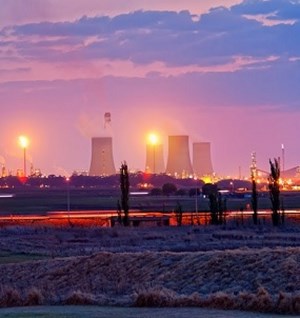African Energy Chamber calls for more US-Africa energy investments
JOHANNESBURG, South Africa — Following President Biden's Interim National Security Strategic Guidance signaling for continued growth in partnerships with African economies, the African Energy Chamber (AEC) believes it is vital to engage U.S. companies and investors to counter the often-wrong preconceptions about investing in the continent, as Africa has some of the fastest-growing economies globally and possesses significant investment and development opportunities for U.S. firms. U.S. companies stand to play a significant role in the road to a lower-carbon future on the continent, and to continue leading some of the most important markets in the energy industry.
From majors like Chevron, ExxonMobil and Kosmos Energy making significant discoveries and operating in multiple countries like Angola, Mozambique, Nigeria, Equatorial Guinea, Senegal, Ghana, and others, to large companies like General Electric, Halliburton, and hundreds of Houston and Oklahoma based companies, some U.S. companies have successfully developed some of the most important projects in the continent. One of the reasons behind their success is a deep and actual understanding of the risks involved and their mitigating factors, as well as a strong connection to the project country and its people.
“Africa, we believe offers a tremendous opportunity for US companies to invest and make returns that are far superior to market returns in many other investment destinations” said Jude Kearney, Chairman of the US-Africa Committee at the AEC. “We would therefore like to encourage more US companies to look beyond unjustified risk perceptions on Africa and actively pursue opportunities in Africa.”
In preparation for the upcoming U.S.-Africa Energy Forum organized by Energy, Capital & Power in partnership with the AEC, the AEC is pleased to announce the launch of its series "Changing the Risk Perception About Africa," comprising of five articles on the following topics:
- Opportunities in Africa's natural gas, gas-to-power, rare earth elements ("REEs") industries, as well as the opening of an M&A market from assets left by IOCs. U.S. firms should take advantage of these opportunities to add lower-carbon projects to their portfolio, to remain at the helm of technological development for energy transition. Large and mid-sized U.S. companies stand to lead Africa’s road to Energy Transition due to its engineering, technology, ingenuity, and ability to create markets. Examples like RWE’s Roscoe wind farm, the largest onshore wind farm in the world installed in Texas, as well as other renewable energy companies as SHYFT Power Solutions, African Renewable Energy Distributor and Juabar, set an example of how the use of that technology and ingenuity can lead the way to a lower-carbon future.
- Mitigation of political and security risks. While some events in the past decades in Africa, like on other continents have undoubtedly endangered the economic stability of the projects or the physical security of the infrastructure, many African countries have responded by showing resilience, changing policies, practices, and procedures to provide certainty to energy projects. Private companies, including some U.S. companies, have participated jointly with the governments in such efforts, and have become experts in mitigating those risks.
- Background and projections dematerializing the perceived finance risk on the continent. Considering the recent history of many African countries, companies and investors should not be afraid of developing projects on the continent, as most projects have reasonable returns, with no issues for private companies to take their fair share of the revenue. The article will also discuss the challenges for securing financing in the past and how investors can align their African investments to the current energy transition drive.
- Mitigation of legal risks and misconceptions of corruption in the continent. Unfortunately, very few countries are free from corruption; however, African governments have adopted policies and practices to mitigate these practices. From a legal standpoint, the article will discuss the standardization of agreements and the remedies available for private companies to settle disputes with other companies or the government.
- How to mitigate exploration and operational risk in the continent. The article will address the importance of technological developments to reduce these risks in the continent and experiences from industry specialists in managing such risks. Large U.S. operators as ExxonMobil and Kosmos Energy have successfully navigated through such risks in the continent. Its experience can set an example for other U.S. firms to learn how to mitigate such risks.
For the last six decades, every U.S. administration has created programs to provide guarantees, loans, and advice to U.S. companies desiring to enter the continent. Such programs have also provided funding, negotiation advice, and capacity-building for African countries to develop their economies. Some of such initiatives include the African Growth and Opportunity Act passed under the Bush Administration, President Obama's Doing Business in Africa Campaign, Power Africa, and Trade Africa. Despite his infamous comments against the continent and his administration's America First foreign policy, even President Trump's administration launched Prosper Africa to increase U.S. – Africa trade and investment.
Despite these initiatives, trade and investment with sub-Saharan Africa have decreased in the past years. Per the Center for Strategic & International Studies, in 2020, the U.S. did approximately $32.6 billion worth of trade, down from $36.8 billion in 2019, representing less than 1% of all U.S. trade in goods. Particularly U.S. involvement in energy and mineral resources falls short compared to Chinese involvement, making investments in the continent a matter of national security.
The AEC invites all U.S. companies to participate in the U.S.-Africa Energy Forum and get involved in the wide range of opportunities the continent offers. We believe the forum is an excellent opportunity to address the stereotypes and misconceptions surrounding investments in Africa.
For more information, visit www.EnergyChamber.org.



